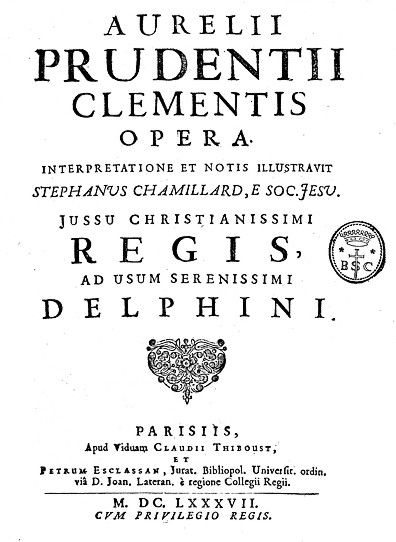Lessico
Clemente Aurelio Prudenzio
Aurelius
Prudentius Clemens, poeta
latino cristiano (Calagurris![]() , oggi
Calahorra, 348 - ca. 410). Di nobile famiglia spagnola, esercitò a Roma
l'avvocatura, raggiungendo alla corte di Teodosio una posizione di prestigio.
In età matura si ritirò a vita privata per dedicarsi interamente alla poesia
religiosa.
, oggi
Calahorra, 348 - ca. 410). Di nobile famiglia spagnola, esercitò a Roma
l'avvocatura, raggiungendo alla corte di Teodosio una posizione di prestigio.
In età matura si ritirò a vita privata per dedicarsi interamente alla poesia
religiosa.
Compose varie raccolte di inni che portano quasi tutte titoli greci: Cathemerinon (Inni per le varie ore della giornata), 12 inni di metro vario destinati ad accompagnare il cristiano nei vari momenti della giornata; Peristephanon (Sulle corone), 14 carmi in lode di martiri; Apotheosis, sulla Trinità e contro le eresie; Hamartigenia (Sull'origine del male), contro i marcioniti; Contra Symmachum, polemica contro le sopravvivenze del paganesimo; Psychomachia (Lotta per l'anima), poema allegorico sul conflitto tra virtù e vizi per il possesso dell'anima; il breve Dittochaeon (Il doppio nutrimento), che illustra episodi dell'Antico e del Nuovo Testamento.
Prudenzio trasferisce i metri e i modi della poesia classica in quella cristiana: per i primi si ispira a Orazio, per i secondi a Virgilio, di cui abbondano nei suoi scritti le reminiscenze. Le dottrine di Prudenzio non sono originali, ma la sua fede fervida gli ispira passi elevati di vera poesia. Ebbe grande fama nel Medioevo, ma non entrò quasi per nulla nella liturgia della Chiesa.

Aurelius Prudentius Clemens was a Roman Christian poet, born in the Roman province of Tarraconensis (now Northern Spain) in 348. He probably died in Spain, as well, some time after 405, possibly around 413. The place of his birth is uncertain, but it may have been Caesaraugusta Saragossa, Tarraco Tarragona, or Calagurris Calahorra.
Prudentius practised law with some success, and was twice provincial governor, perhaps in his native country, before the emperor Theodosius I summoned him to court. Towards the end of his life (possibly around 392) Prudentius retired from public life to become an ascetic, fasting until evening and abstaining entirely from animal food. Prudentius later collected the Christian poems written during this period and added a preface, which he himself dated 405.
The poetry of Prudentius is influenced by early Christian authors, such as Tertullian and St. Ambrose, as well as the Bible and the acts of the martyrs. His Christmas plainsong hymn Divinum Mysterium ("Of the Father's Love Begotten") and the hymn for Epiphany O sola magnarum urbium ("Earth Has Many a Noble City"), both from the Cathemerinon, are still in use today. The allegorical Psychomachia, however, is his most influential work and became the inspiration and wellspring of medieval allegorical literature.
The works of Prudentius include:
Liber Cathemerinon -- ("Book in Accordance with the Hours") comprises 12 lyric poems on various times of the day and on church festivals.
Liber Peristephanon -- ("Crowns of Martyrdom") contains 14 lyric poems on Spanish and Roman martyrs.
Apotheosis -- ("Deification") attacks disclaimers of the Trinity and the divinity of Jesus.
Hamartigenia -- ("The Origin of Sin") attacks the Gnostic dualism of Marcion and his followers.
Psychomachia -- ("Battle of Souls") describes the struggle of faith, supported by the cardinal virtues, against idolatry and the corresponding vices.
Libri contra Symmachum -- ("Books Against Symmachus") oppose the pagan senator Symmachus's requests that the altar of Victory be restored to the Senate house.
Dittochaeon -- ("The Double Testament") contains 49 quatrains intended as captions for the murals of a basilica in Rome.